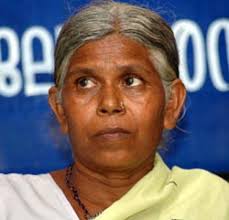
Mayilamma: Iconic Face of the Plachimada Struggle
If a soft drink industry owns a piece of land, can it exploit the ground water without any limit? This is the core issue in what came to be known as the Plachimada case in Kerala, India.
In January 2000, the Perumatty Panchayat gave permission to Hindustan Coca-Cola Beverages (HCCB) to set up a bottling plant in Plachimada, Palakkad District of Kerala. The company began drawing groundwater and producing cola. The Panchayat received an annual income of about ₹600,000 in the deal. In addition, the plant provided employment for about 400 people.
By early 2002, the villagers started noticing changes in the water quality in the area. They felt that the plant was drawing too much water from the ground and this was affecting the harvest of rice and coconuts. In April 2002, the villagers started an agitation against the plant.
The protest in front of the plant’s entrance had been going on for nearly a year, when the Panchayat issued a notice to the company in April 2003 cancelling its licence. The company took the matter to the Kerala High Court. In July 2003, a BBC Radio inquiry found that the sludge distributed by the company to the villagers as fertilizer actually contained toxic material.
While the case was going on, HCCB approached the government, which questioned the Panchayat’s action and wanted an expert committee to study the issue. The Panchayat moved the Court against the government order. The company’s stand was that it was not drawing excessive amounts of water. Meanwhile the villagers continued their protest, even as the employees started an agitation in favour of the plant’s continuance.
In December 2003, the Court ordered HCCB not to draw water from the ground and to find alternate sources of water. The Judge said that the company had no right to extract excessive natural wealth and the Panchayat and the government were bound to prevent it. The ground water was a national resource, which belonged to the entire society and not to the company even though it owned the land. The Judge quoted the decisions of the Supreme Court of India in this regard. He also directed the Panchayat to renew the plant’s licence and restrained it from interfering with the functioning of the factory.
In March 2004, HCCB suspended operations at its plant of its own accord. In April 2005, however, in a reversal of the earlier verdict. the High Court of Kerala directed the panchayat to renew the license of HCCB to operate its plant in case it wanted to. It entitled HCCB to draw ground water up to 5 lakh litres per day. HCCB still decided not to operate the plant. The panchayat and others appealed to the Supreme Court and the case went on for years.
The Plachimada case became the focal point for the debate on the people’s right to water and a company’s right to exploit the water under its land. Plachimada was the venue of a World Water Conference in January 2004 after the conclusion of the World Social Forum in Mumbai. The Conference issued the Plachimada Declaration asserting people’s right over water and supporting the Plachimada struggle.
In 2011, the Plachimada Coca-Cola Victims’ Relief and Compensation Claims Special Tribunal Bill was passed by the Kerala state legislature to adjudicate disputes relating to compensation to be paid by Hindustan Coca-Cola Beverages Limited for the damaged caused by it. It was, however, returned by the central government without presidential assent and even termed unconstitutional on grounds of legislative competence.
Afterword: In July 2017, Hindustan Coca-Cola Beverages Limited, informed the Supreme Court of India that it had no plans whatsoever to restart operations in its bottling plant in Plachimada. With that the curtain came down on a long struggle.
Special Note: A remarkable feature of the struggle was the role played by Mayilamma (1940-2007), an illiterate tribal woman, who was the founder of the Coca-Cola Virudha Samara Samiti (Anti Coca-Cola Struggle Committee) in Plachimada which spearheaded the campaign against Coca-Cola. Her iconic leadership kept the struggle going for so many years. Unfortunately, she died before the final resolution of the case in the Supreme Court. Her contribution is described in the book Mayilamma: The Life of a Tribal Eco-Warrior by Jothibai Pariyadath.

Inspiring story. I am happy to note that while rich and powerful may have an undue advantage, they at least can be challenged and sometime they do lose!
When you start drawing the water underneath from your plot, water from the neighboring plat will start flowing towards your land, they how can you ever say you are only using your water!
It is important to note the spirit of Mayilamma. An illiterate, with no wherewithal, confronts against a large company with abundant resources. I agree that the village Panchayat was lured by the income generated from the deal. However, they could not perceive the foul play of the corporate. If there is ethics in business, it is essential to travel the last mile of ensuring that it is safe for the communities around. How many companies are really concerned about community’s welfare? All is in the name of profit and running behind money, with the object of remaining on top and all powerful.